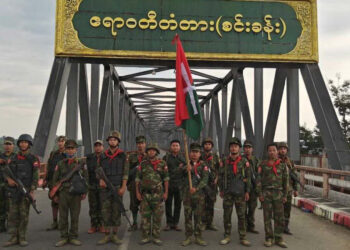A 38-year-old pregnant woman died of COVID-19 in Cikha, in Chin State’s Tonzang Township near the Indian border, on Sunday night, three days after the junta imposed lockdowns in the area to contain the spread of the coronavirus.
She was admitted to a hospital on May 28 and tested positive for COVID-19. She had difficulty breathing and died at 11:35 p.m. on Sunday but had no history of underlying disease, according to Dr. Thang Sian Khaing of the Tonzang Township Public Health Department.
The victim, a Cikha resident, was eight months pregnant. The fetus died and her three children were left with the father.
The junta last Friday imposed stay-at-home orders on Tonzang and Sagaing Region’s Tamu—adjacent townships on the Indian border—to curb the spread of the coronavirus.
Friday’s stay-at-home orders are the first since the military seized power by overthrowing the country’s democratically elected government on Feb. 1. They were imposed a day after Myanmar reported 96 new cases of COVID-19, the country’s highest daily rise in coronavirus cases since Feb. 6.
Tonzang Township had 82 COVID-19 patients as of Sunday, as the town increased testing for COVID-19, with 25 more positive cases detected on that day alone. Ten patients are currently receiving intensive care and have to use ventilators.
Although many of the COVID-19 patients had no history of traveling outside of their area, it is suspected that the virus was spread from neighboring India, which is experiencing a spike in cases.
“Even though India has locked down to contain the spread of the coronavirus on their side, we think the disease was spread by those illegally crossing the border,” the health official said.
At a meeting with state and regional health care officials on Friday, the junta’s health minister said the military government will conduct tests to determine whether the recent cases are from new variants of the virus.
While the tests are ongoing, the township hospital is in need of support in the form of medicine and health-care staff to treat the patients.
Dr. Thang Sian Khaing said, “Shortages of medicine and health-care staff are the immediate issues. There is not enough staff, as many of the health-care staff have joined the civil servants’ strike, while we can’t make referrals to hospitals in other townships as they can’t accept them.”
In defiance of the military coup, doctors and nurses initiated the Civil Disobedience Movement (CDM) on Feb. 3, refusing to work under the coup leaders. The movement has since been joined by other civil servants working in various sectors including energy, education, labor and transport.
The number of daily swab tests being administered in Myanmar has declined dramatically since the coup.
Under the ousted civilian government, around 16,000 to 18,000 swab tests a day were carried out in January. But since the coup, only around 1,500 to 2,000 tests per day have been administered.
Many striking doctors and others continue to refuse to work under the military regime. Some have joined the civilian National Unity Government, which was formed to topple the military regime, while some have returned to work.
You may also like these stories:
At Least 11 Junta Troops Killed as Ethnic Alliance Attacks in Northern Shan
Myanmar Crisis Poses Strategic Challenges for Thailand
Myanmar Junta Forces and KIA in Fresh Fighting in Northern Myanmar

















